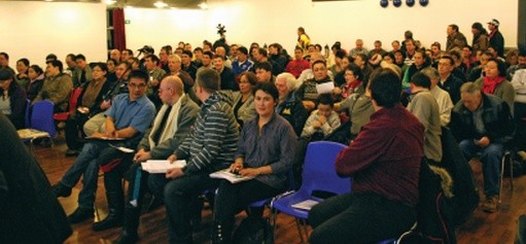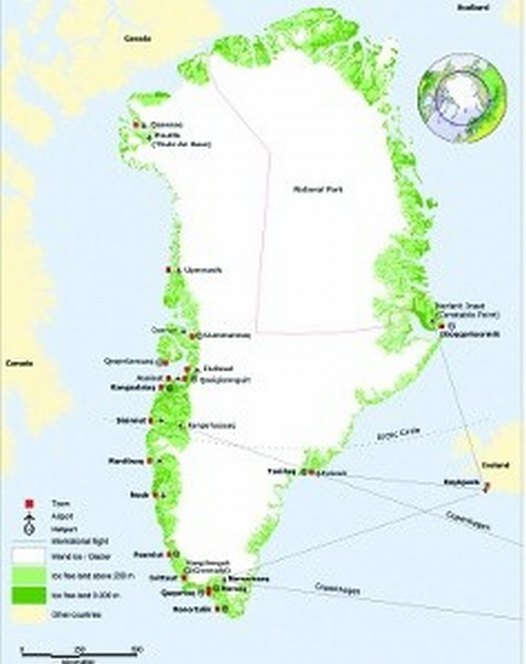
Inhabitants at Maniitsoq discussing the future of the possible Alcoa aluminium smelter. Photo: Rasmus Ole Rasmussen
The realisation, since 2006, that Greenland was about to get its first aluminium smelter has, for instance, created an additional boost to the ongoing modernisation process. With the aluminium smelter project, Greenland has been exposed like never before to the institutional dimensions of modernity and globalisation as defined by Anthony Giddens (1990).
A quick look at these four dimensions (see box inserts) as they relate to Greenland and the aluminium smelter project shows the deep impact the project has already had on Greenlandic society.
Infrastructure development in the 1950s and 1960s did not expose Greenland to the full consequences of capitalism nor have the growing mining activities of the 1990s and 2000s done so. In reality, it is not until now - with the aluminium smelter - that Greenland is really getting a taste of the capitalist economy with a huge multinational company like Alcoa as the major external player. Here discussions are primarily concerned with what such a multinational giant can do both for and to a small society like Greenland.
The fishing industry has effectively been industrialised since the 1960s, but due to the protected nature of the labour market, the full consequences were not really appreciated. For the construction industry, the de facto division of labour was only an internal division between Denmark and Greenland. Mining activities have attracted workers from across the global labour market but the consequences of this have not really been visible locally. It is not until now with the planned construction of the aluminium smelter that Greenland is really experiencing being part of a global labour market. One of the major concerns here is, for some, the prospect of having up to 3 000 Chinese workers constructing the aluminium smelter on ‘international wages’.
The Danish state initiated an intensive process of socio-economic research from the 1950s onwards in order to develop a better understanding of the mechanisms supporting Greenland’s culture and society. The purpose here was to create a better basis for the Danish governance of Greenland. From the beginning of the 1970s, administrative responsibility has increasingly been transferred from Denmark to Greenland with Home Rule in 1979 and Self Rule in 2009 as the two most significant milestones.
Most of the socio-economic knowledge produced about Greenlandic society has been generated for administrative reasons. Indeed, it is not until now - with the debate over the aluminium smelter etc., - that Greenland has really experienced how different groups of stakeholders can question the information provided by the authorities for public debate. Both national and international environmentalists are sceptical about the results of official environmental studies, cultural protectionists are alarmed by the potential destruction of archaeological sites, labour organisations are concerned about the economic calculations provided by the authorities, while democracy advocates point to the lack of democratic influence on the political decision process.
| |
Advantages of globalisation
Increased economic wealth
Increased mobility
Increased communication
and access to information
Increased cultural tolerance |
Disadvantages of globalisation
Increased inequality
Increased pressure on nature
Increased competition
Increased insecurity
Increased control of information
Increased nationalism
Increased pressure on culture |
| |
|
|
Only the military power dimension does not seem to have been explicitly activated. It is worth noting however, what the political calculations may have been when the choice was made in spring 2008 to accept the bid made by American-based Alcoa rather than that of the competing Norwegian-based Norsk Hydro. Could geopolitical factors relating primarily to the existence of US military bases in Greenland have played a role here, either implicitly or explicitly, in the final choice?
During the process of public debate, the dominant opinion has varied according to the locality and the stakeholder concerned. The authorities and the town of Maniitsoq where the aluminium smelter will be located focus, in the main, on the prospect of rising incomes and increased economic wealth.
The supposed economic advantages of the aluminium smelter have however been challenged by many stakeholders. The peripheral municipalities point to its likely generation of increasing inequality. The environmentalists and cultural protectionists draw attention to the increasing pressure on nature and on the cultural heritage the smelter will undoubtedly bring. Both the worker’s and the employer’s associations are, moreover, worried about the increasing external economic competition it will likely generate while the cultural NGO ICC is concerned about the pressure on Inuit rights.
The final political decision on whether or not to give the go ahead for the first aluminium smelter in Greenland will be taken before the summer 2012. No matter what decision is made the process used to reach it has clearly changed Greenland forever. The process has created a more mature Greenland. Indeed Greenland is now seen as ‘a player’ in the global economy rather than merely a target for decisions made by others. Greenland has, economically and politically, come of age.
It is not however for Greenland to decide whether to be part of the global market; it will be the global market that will decide whether to include Greenland. The aluminium smelter project is likely to be the first of many doors through which Greenland must pass in order to fully embrace the global marketplace and for the global marketplace to fully embrace it.
Elements of globalisation – Based on Giddens (1990)
Modernity
Capitalism
Industrialism
Surveillance
Military power |
Globalisation
Capitalist economy
Division of labourSurveillance
National-state system
World military order |
Activists
Environmentalists and protectionists
Labour organisations
Democracy advocates
Peace movement |
References:
Giddens, Anthony. (1990). The consequences of modernity. Cambridge: Polity Press.

The Alcoa impact so far...
Alcoa is not willing to build the new aluminium smelter in Greenland unless it is allowed to import cheap Chinese labour for the construction of the production plant as well as the two hydro-electric power-stations planned to supply the smelter (business.dk 11.03.11). The American multinational company thus made it clear that it wants to follow the same procedures as were used previously when building similar structures in Eastern Iceland (see pp 18-19).
Greenland's parliament the Inatsisartut has not yet however taken the final vote on whether to give the 'go ahead' for the construction of this first large industrial development in Greenland. They have however decided that the location of the smelter should be at Maniitsoq. A decision on possible Greenlandic co-ownership of the smelter and power-stations, as well as one on building-procedures, is expected in spring 2012.
Construction can begin at the earliest in 2013. It will last for five years and it is estimated that some 2 600 workers will be needed during the peak construction period. The total cost is likely to be between 15 and 20 billion DKK. At operation, around 625 employees will be needed for the smelter and another 25 for the two power-plants. It is estimated that there will. probably be an additional 300 jobs for suppliers etc., when the production process is up and running (Source: Greenland Development).
By Odd Iglebaek